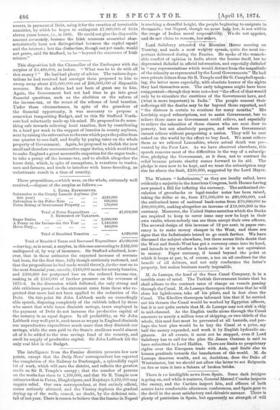Lord Salisbury attended the Idaneien Rouse meeting on Tuesday, and
made a most weighty speech, quite the most im- portant delivered during the Famine. He spoke of the remark- able conflict of opinion in India about the famine itself, but he deprecated disbelief in official information, and especially disbelief in "any representations which would detractfrom the magnitude' of the calamity as represented by the Local Governments." He had seen private letters from Sir R. Temple and Sir G. Campbell speak- ing, the latter more especially, with absolute horror of the sights. they had themselves seen. The early telegrams might have been exaggerated—though they were not—but "the effect of that would only be to stimulate the exertions of the Government here, and (what is more important) in India." The people conceal their- sufferings till the deaths may be far beyond those reported, and "the distress is certain to continue for many months." His Lordship urged subscriptions, not to assist Government, but to relieve those cases no Government could relieve, and especially to relieve the calamities of those classes who are next door to. poverty, but not absolutely paupers, and whom Government- cannot relieve without pauperising a nation. They will be cast naked on the world by the effort to buy food. We must relieve them as we relieved Lancashire, where actual death was pre-_ vented by the Poor Law. As we have observed elsewhere, this. speech removes most of the difficulties in the way of a subscrip- tion, pledging the Government, as it does, not to contract its relief because private charity comes forward to its aid. The- pledge is sine now to be kept, and we trust the subscription may rise far above the limit, £250,000, suggested by the Lord Mayor..


































 Previous page
Previous page